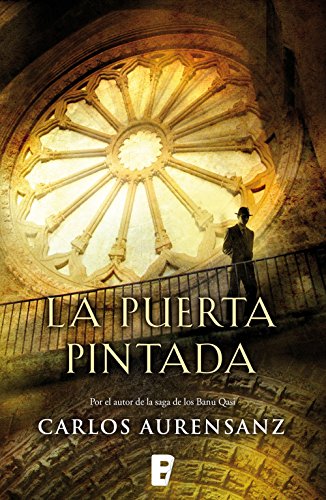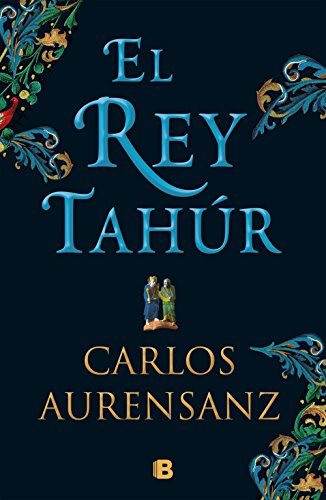From Tudela comes one of the most powerful new writers of historical fiction, Charles Aurensanz. Generationally among authors such as Jose Luis Corral y louis clog with which it shares denomination of origin between Navarra and Aragón. And among these and many others, fusing their plots in a melting pot of historical fiction that includes the chronicle but also recreates the most necessary intrahistories to make a vivid fresco of any era.
In the case of Aurensanz we find a variable scenery in an interesting combination of remote times with very recent times. The question is to find the best setting in this type of authors delighted to take us back to the past. Either to let us know ways of life and events of all kinds or also assuming the task of giving life to characters that charge credibility and transcendence to that sum of transforming moments of the historical or the human.
An irrefutable invitation from a pen that equips its plots with everything necessary to make us enjoy the trip. Novels where the chronic and the human blend with a goldsmith's meticulousness in charge of giving life in all its details seen from the closest focus.
Top 3 recommended novels by Carlos Aurensanz
The fabric of days
There is some impossible nostalgia in the times lived by our parents. That's why a reading like this is a kind of catharsis, like a mother's story told as an unexpected confidence. Once we delve into this story, everything takes on another dimension from the vision of a close story, of experiences on the verge of survival among all kinds of vicissitudes.
Zaragoza, 1950. Young Julia arrives in the city alone and pregnant, the result of a forbidden relationship with a man who has just died. Although she knows the difficulties involved in being a woman in her conditions, the desire to carve out a decent future for her son leads her to set up a haute couture salon, with the help of Rosita, a young dressmaker.
Attracted by his talent, women from Zaragoza's wealthiest families will soon flock to the workshop to admire the modern fabrics and the most glamorous dresses of the time. This is how Julia will meet the Monforte family and the lives and desires of those who work for them: the doorman, the maids, the driver, the governess and the cook who, in those days, will become her family.
While Julia tries to hide the past of the man she loved and build a future for her son, an unspeakable secret that had been hidden for generations in the Monforte mansion will come to light and change the lives of its inhabitants forever.
Carlos Aurensanz establishes himself as one of the most talented narrators in our country in this novel in which, just as threads intersect in the warp of fabrics, the daily life of the characters intertwines to draw the tapestry of a great story.
the painted door
The resource of the comings and goings from one time to another gives the reader an omniscient notion of everything that happens in a plot and a privileged perspective on what may happen. But sometimes it is just a nod from the author so that we feel that feeling of being in control of the story. That is why this resource can be a fascinating trompe l'oeil. Because things are not always what they seem and the fact of knowing facts and consequences does not have to aim at knowing everything that happens between those moments...
Year 1949. The appearance of a corpse by the river is about to disrupt the lives of the inhabitants of Puente Real, a quiet post-war provincial town. It is only the first of a series of strange crimes that will forever change the life of Don Manuel, the forensic doctor in charge of the investigation.
Year 1936. The Civil War has broken out. Despite him, the lives of Salvador, a leftist sympathizer printer, and his wife Teresa, a teacher at a school in the Republic, are inexorably dragged towards tragedy and death.
The protagonists of these two moments masterfully weave a story that is in itself a thrillerr, but also a novel of manners that portrays the closed post-war society, without shying away from the stark drama of the Civil War and the subsequent repression.
It also has elements typical of a Gothic novel, such as the main setting where the plot takes place, the Puente Real cathedral, the bell ringer's home located on its roof and, above all, its magnificent Judgment Gate, in which The punishments that await sinners are revealed, dramatically sculpted in stone. In the midst of all this, an improbable love story ends up breaking through to lead us to the final outcome.
The gambler king
Being one of Ejea, which is barely 40 kilometers from Tudela, this story about the founding of Tudela has a special charm. The matter takes on an epic and genesis dimension of those of Ken Follett. Because at the end of the day it is about that, discovering here nearby or thousands of kilometers away, how the world began to walk for a multitude of what today are towns and cities...
Kingdom of Navarre. Year of the Lord 1188. Tudela, the town that houses the Court, is experiencing a moment of effervescence decades after Alfonso the Battler took control of it from the Muslims. The new jurisdiction has attracted hundreds of foreign settlers to a place where everything remains to be done: the citadel is being transformed into a castle and royal seat, the Moorish neighborhood grows outside the walls, churches are built everywhere, hand in hand with the Cistercian Monasteries and convents arose and the powerful orders of chivalry financed their presence in the Holy Land with parcels from the fertile lands of the Ebro.
The works on the new collegiate church are advancing and it is necessary to occupy the site of the old mosque. Nicolás, a young apprentice stonemason of Burgundian origin, works on its demolition when the pavement seems to give way under his feet. He returns during the night to discover a hidden crypt under the old mihrab and, in it, apparently forgotten, a Muslim chest with a tattered scroll inside. It will be the discovery that marks not only his own destiny, but that of everyone who is aware of its existence, that of the kingdom of Navarra itself and, ultimately, that of all of Christianity.



